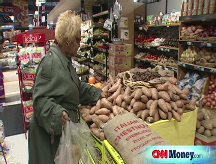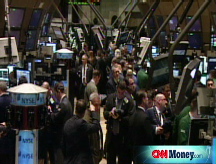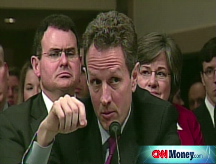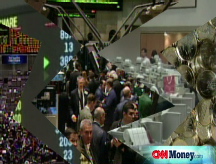Dow's winning streak rises to 4
Stocks surge ahead of Thanksgiving as Obama news and automaker strength boost stocks.

NEW YORK (CNNMoney.com) -- Stocks surged Wednesday, with the Dow industrials and S&P 500 rallying for the fourth session in a row, as investors scooped up stocks hit in the recent selloff, ahead of the Thanksgiving holiday.
A rally in the bond market sent the corresponding yields lower, with the benchmark 10-year note falling below 3% for the first time ever.
The Dow Jones industrial average (INDU) gained 2.9%, ending higher for the fourth consecutive session. The Dow hasn't closed higher for four sessions in a row since the streak ended August 18th.
The Standard & Poor's 500 (SPX) index gained 3.5%, also closing higher for the fourth session in a row. It was the first four-session run for the S&P 500 since May.
The Nasdaq composite (COMP) gained 4.6% and has closed higher for three of the last four sessions.
All financial markets are closed Thursday for Thanksgiving and close early Friday.
Stocks tumbled in the morning on weak economic reports, but staged a comeback in the afternoon. The latest addition to President-elect Obama's economic team, a rally for the automakers and seasonal factors all contributed to the advance.
"I think it's good we are seeing advances despite bad news," said John Merrill, chief investment officer at Tanglewood Capital Management. "The bad economic news is going to keep coming, so when the market starts to look forward, that's a positive sign."
Merrill said that this doesn't mean the tough period for stocks is over, but it does suggest that the level of investor fear has been tapering off. Last week, the CBOE Volatility (VIX) index, or the Vix, closed at an all-time high above 80, implying all-time records of investor fear.
The announcements from Obama throughout the week have been another step in the right direction, Merrill said. "Even detractors are impressed with the quality of the team and the way it's been unfolded."
Saying, "help is on the way," the president-elect announced Wednesday the creation of a special economic advisory board to be headed by former Federal Reserve Chairman Paul Volcker. Volcker is the latest addition to the economic team Obama announced this week.
Investors also benefited from the tendency of stocks to post gains in the trading days surrounding Thanksgiving, according to the Stock Trader's Almanac. Between the Wednesday before Thanksgiving and the Monday after, the Dow has gained in 14 of the last 20 years by an average of 470 points.
Stocks began rallying last Friday as reports surfaced that Obama would nominate New York Fed Bank president Timothy Geithner to head the Treasury. Reports also ran rampant that Citigroup would get a government bailout.
Both reports were confirmed this week and helped keep stocks rallying. On Tuesday the government announced a plan to pump $800 billion into the U.S. economy to get banks to lend to consumers and small businesses.
Economy: Most economists believe that the economy is in recession, despite the lack of an official declaration. Wednesday's reports attested to the depth of that recession.
Overall, the morning reports have showed that "things have gotten worse," said Gus Scacco, managing director at AG Asset Management.
Yet, the numbers released Wednesday are "backwards looking," he said. "We're hoping that some of the changes instituted yesterday will eventually help bring down borrowing rates."
October sales of new homes tumbled to an annual rate not seen in roughly 18 years, the government reported. The decline was worse than what economists expected and suggests that the housing market has not yet bottomed.
Consumer spending continued to slump, the government reported, with spending down 1% in October after falling 0.3% in September. That was the biggest decline since September 2001 and worse than economists had forecast. The core PCE deflator, which measures spending without food or energy costs, rose 2% over the past 12 months, versus a rate of 2.2% in September.
Personal income rose 0.3%, after rising 0.2% in September. Economists thought income would rise just 0.1%.
Consumers also spent less on big-ticket items meant to last three years or more, with orders for durable goods slumping sharply in October. The report was seen as another worrisome indicator for the manufacturing sector.
A regional manufacturing report, the Chicago PMI, slumped to a fresh 26-year low in November, falling to 33.8 from 37.8 in October. Economists were expecting a slight improvement in the reading.
Another report showed that the number of Americans filing new claims for unemployment dropped last week from 16-year highs hit the previous week. However, claims still remained at high levels above 500,000.
And consumer sentiment continued to erode, according to a report from the University of Michigan. Its November sentiment index was revised down to 55.3 from an initial reading of 57.9. Economists thought it would be revised up to 58.
Automakers: GM (GM, Fortune 500) rallied 35% and Ford (F, Fortune 500) rallied 30% on growing bets that the two companies and Chrysler will receive a government bailout after all. Deutsche Bank put out a note late Wednesday saying the industry's prospects have improved.
The industry was rebuffed last week when it made its first pitch to Congress. But there is increased speculation that its second pitch, expected next week, will be more successful.
The companies have until Dec. 2 to submit proposals for how they would use $25 billion in taxpayer money to make their companies "viable." The House Financial Services Committee holds a hearing next Friday and the Senate Banking Committee is expected to hold a hearing too.
Citigroup (C, Fortune 500) gained 16%, leading the bank sector higher. Other big Dow gainers included energy components Chevron (CVX, Fortune 500) and Exxon Mobil (XOM, Fortune 500) and aluminum producer Alcoa (AA, Fortune 500).
Market breadth Wednesday was positive. On the New York Stock Exchange, winners beat losers five to one on volume of 1.42 billion shares. On the Nasdaq, advancers topped decliners by almost four to one on volume of just under 2 billion shares.
Other markets: In global trade, Asian markets ended in mixed territory and European markets ended lower.
China slashed a key interest rate and also lowered the amount of money banks must set asides as reserves, in an effort to increase lending.
The dollar gained versus the euro and the yen.
U.S. light crude oil for January delivery rose $3.67 to $54.44 a barrel on the New York Mercantile Exchange.
COMEX gold for February delivery fell $9.20 to $811.30 an ounce.
Gasoline prices continued the fall to nearly four-year lows, with gas down 1.7 cents to a national average of $1.868 a gallon, according to a survey of credit-card swipes released Wednesday by motorist group AAA. Prices have been sliding for more than two months, losing almost $2 a gallon or 51%.
Bonds: Treasury prices rallied, lowering the yield on the benchmark 10-year note to 2.98% from 3.10% Tuesday. Last week, the 2-year, 10-year and 30-year government bonds all hit their lowest levels since the Federal Reserve started keeping records in 1962.
The yield on the 3-month Treasury bill fell to 0.07% from 0.105% Tuesday, not far from 68-year lows of zero hit last week. The 3-month is seen as the safest place to put money in the short term. A low yield means wary investors would rather preserve their cash despite earning no interest on it than risk the stock market.
Lending rates were mixed. The 3-month Libor rate fell to 2.18% from 2.20% Tuesday, while overnight Libor rose to 0.99% from 0.93% Tuesday, according to Dow Jones. Libor is a key bank lending rate. ![]()





